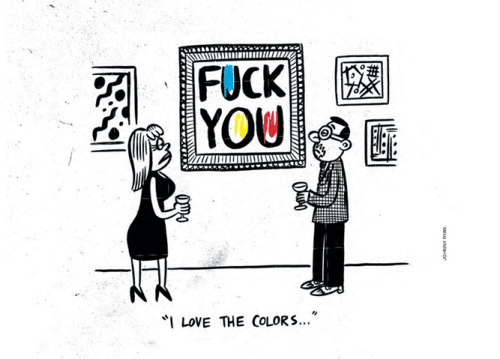Our Block Ads! site reached the front page of Hacker News on Friday. It sparked a big discussion—over 120 comments! Thanks everyone who upvoted and gave us feedback about the tool. We’ve started work on improving it and will post about the changes soon.
I want to address some of the feedback we’ve received, as much of it comes up whenever ad blocking is discussed. Let’s start here:
A big part of the web is paid by ads. Lots of websites rely on (non-invasive) ads to sustain themselves and provide content to anyone for free.
‘Non-invasive advertising’ is an oxymoron. Truly non-invasive advertising would be no advertising at all. Why should any of us put up with being advertised to when we have no interest in giving our attention to advertisers? Advertising is not some noble industry that deserves our attention. If you put advertising on your site, you’re selling your audience out to advertisers. Don’t expect them to thank you for it or go out of their way to make sure you make money from it. If ad blocking continues to grow, which we hope it will, other ways of funding will be found.
Some people commented that they don’t mind ads, but object to the spying, malware, intrusive stuff that is often hard to control when the site publishing the ads isn’t in control of who produces and serves the ads. That’s a very good argument in itself for blocking ads. But even if that were dealt with tomorrow—if we got ads that didn’t spy on us, didn’t introduce malware into our machines, weren’t ‘obnoxious’—we’d still be blocking them. Why? Because we’re not interested in being advertised to. It’s that simple.
We have a visceral dislike of advertising. We don’t think there’s such a thing as a ‘good’ or even ‘acceptable’ ad. We think Adblock Plus’ Acceptable Ads Manifesto is a joke. When someone installs an ad blocker, by default all ads should be blocked.
The sorry state of ad blockers
Many ad blockers are now in bed with the advertising industry. We suggest you stay away from these:
Adblock, Adguard, Adblock Plus
These blockers maintain a list of advertisers that they deem ‘acceptable’. The list of ‘acceptable’ advertisers is always growing. The user has to opt out of the list to get full ad protection.
Not all of its 144 million or so users know this, but Adblock Plus comes preloaded with a filter that allows some ads to be shown. That white list is turned on by default when someone installs Adblock Plus, so users must manually opt out if they don’t want to see any ads. Those ads that don’t get blocked come from companies and organizations that Adblock Plus calls “strategic partners.” —RIP: Adblock Plus: Your shady whitelisting ways mean you’re dead to me.
This, from a company the BBC describes as “at the forefront of ‘click-bait’” is just one example of what Adblock and Adblock Plus deem ‘acceptable’:
Ghostery
Ghostery blocks marketing companies from gathering website user information, but it makes money from selling page visit, blocking and advertising statistics to corporations globally, including corporations that are actively engaged in collecting user information to target ads and other marketing messages to consumers. —Wikipedia
On its homepage it boasts that it’s “trusted” by companies like Unilever, Nike, Target and Home Depot. I don’t know about you, but I don’t want my ad/privacy protection coming from an organisation who’s proud of its partnerships with corporations I want to be protected from.
Use uBlock Origin
Free. Open source. For users by users. No donations sought.
It’s a fantastic blocker, not just for ads but for privacy and malware protection too. And unlike Adblock/Adblock Plus, it comes with a filter list that doesn’t make allowances for certain ads.
Note: We are not affiliated with uBlock Origin.
Update 2016-03-09: This post was discussed on Hacker News and on Reddit.
This response on the Reddit thread puts it rather well:
Using ad blocking tools is cutting off a significant proportion of revenue.
Yea! Victory.
Most websites require ad revenue to deliver roi
Then it sounds like, in the absence of advertisements forcing themselves upon individuals wherever they go on the web, sites would need a different financial model than to resort to aiding in the brainwashing of their visitors with literal corporate propaganda.

